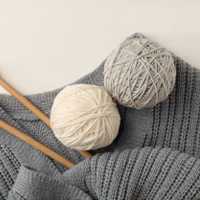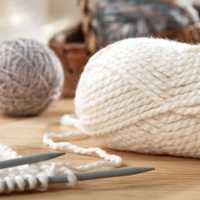The Best Tips for Knitting With Lace Yarns - A Delicate Delight
By Katherine Foster
The Best Tips for Knitting With Lace Yarns - A Delicate Delight
By Katherine Foster
For many, the first experience of knitting with lace weight yarns is not what they expect. These yarns are so delicate that the knitter must beware of all that is surrounding them and the possibility of the yarn snagging or ripping on even the smallest thing. In most cases there is no repairing the yarn once this occurs. Even experienced knitters are shocked to find how difficult it can be, but the results are breathtaking.
The thing is, lace weight yarns are so beautiful and drape so lovely that there is not alternative to the products that are produced by them. That's why most knitting enthusiasts want to learn how to handle and knit with lace weight yarns. Thankfully, there are some tips that can be followed in order to experience success.
Tiny Needles
Many don't realise there are tiny knitting needles made just for knitting with lace weight yarns. They allow the knitter to make more careful combinations and create their lacey masterpiece. Typical knitting needles are bulky and difficult to use in such a delicately sweet arrangement.
So the first step or tip for working with lace weight yarn is to pick up a pair of these cute, little needles that will soon become a best friend. Lace yarn tends to slide on and off the needle with ease, causing one to drop stitches. Bamboo or wooden needles will give a better grip until the knitter is used to using lace weight yarn, then they can switch to something that will give them speed.
Lace Equals Luxury
So what exactly is lace yarn? One will find it is the lightest weight of all yarns available, so light that ultimately it weighs in at zero pounds. It is used to create luxurious scarves, gloves, hats and shawls among other eye-catching accessories. It comes in a wide variety of colours to include classic, to neutral and even neon.
There are even metallic threads! This allows the knitter to create unique pieces with various textures. However, because it is so very delicate it does take an experienced knitter to make products with lace weight yarns.
Snags and Frogs
While this may sound like a title from a fantasy novel, snags and frogs are terms associated with knitting as any experienced knitter knows. Lace weight yarn is by far the most difficult to work with, and snags happen easily and often. It simply cannot be tugged or pulled, or it will likely end up breaking.
Frogging is a term that refers to ripping out already completed work and starting over. With lace weight yarn there's no frogging, really. Unless the knitter is very gentle chances are they can't "rip" out any work without damaging the yarn.
Choosing Stitch Markers
Those stitch markers that lock in place are best for lace weight yarns. This will keep the light and fragile lace yarn from moving out of place. Split-ring markers never work for lace yarn projects as it will slip right out with ease, leaving the knitter frustrated at best.
Try Blocking
While many experienced knitters don't like blocking their projects, lace weight yarn is the perfect candidate for blocking. This is because one wants a sort of shape to their finished product rather than having it limp-looking. In addition, blocking will allow the project to drape beautifully as one would expect it to.
Also, skein at the end of a row rather than in the middle. It's very difficult to hide because of the open style of the lace weight products.
Hopefully, armed with these tips one will be able to impress their friends and loved ones with a beautiful lace knitted project.
Little Houndales Knits has been offering the finest in yarns, wool, patterns, needles, bags and accessories for knitting enthusiasts since 2010. They began by securing space at local farmer's markets and have now grown to an online store as well. The desire to provide proper wool to knitters helped give them the drive to build up a large selection of yarns made from their own sheep, and other products from only premium and favourite brands as well as niche brands. In addition to the online shop, buyers can visit Little Houndales Farm if desired, and get advice or browse products. Their website can be found at http://www.littlehoundalesknits.com.
Article Source: http://EzineArticles.com/expert/Katherine_Foster/1967639
For many, the first experience of knitting with lace weight yarns is not what they expect. These yarns are so delicate that the knitter must beware of all that is surrounding them and the possibility of the yarn snagging or ripping on even the smallest thing. In most cases there is no repairing the yarn once this occurs. Even experienced knitters are shocked to find how difficult it can be, but the results are breathtaking.
The thing is, lace weight yarns are so beautiful and drape so lovely that there is not alternative to the products that are produced by them. That's why most knitting enthusiasts want to learn how to handle and knit with lace weight yarns. Thankfully, there are some tips that can be followed in order to experience success.
Tiny Needles
Many don't realise there are tiny knitting needles made just for knitting with lace weight yarns. They allow the knitter to make more careful combinations and create their lacey masterpiece. Typical knitting needles are bulky and difficult to use in such a delicately sweet arrangement.
So the first step or tip for working with lace weight yarn is to pick up a pair of these cute, little needles that will soon become a best friend. Lace yarn tends to slide on and off the needle with ease, causing one to drop stitches. Bamboo or wooden needles will give a better grip until the knitter is used to using lace weight yarn, then they can switch to something that will give them speed.
Lace Equals Luxury
So what exactly is lace yarn? One will find it is the lightest weight of all yarns available, so light that ultimately it weighs in at zero pounds. It is used to create luxurious scarves, gloves, hats and shawls among other eye-catching accessories. It comes in a wide variety of colours to include classic, to neutral and even neon.
There are even metallic threads! This allows the knitter to create unique pieces with various textures. However, because it is so very delicate it does take an experienced knitter to make products with lace weight yarns.
Snags and Frogs
While this may sound like a title from a fantasy novel, snags and frogs are terms associated with knitting as any experienced knitter knows. Lace weight yarn is by far the most difficult to work with, and snags happen easily and often. It simply cannot be tugged or pulled, or it will likely end up breaking.
Frogging is a term that refers to ripping out already completed work and starting over. With lace weight yarn there's no frogging, really. Unless the knitter is very gentle chances are they can't "rip" out any work without damaging the yarn.
Choosing Stitch Markers
Those stitch markers that lock in place are best for lace weight yarns. This will keep the light and fragile lace yarn from moving out of place. Split-ring markers never work for lace yarn projects as it will slip right out with ease, leaving the knitter frustrated at best.
Try Blocking
While many experienced knitters don't like blocking their projects, lace weight yarn is the perfect candidate for blocking. This is because one wants a sort of shape to their finished product rather than having it limp-looking. In addition, blocking will allow the project to drape beautifully as one would expect it to.
Also, skein at the end of a row rather than in the middle. It's very difficult to hide because of the open style of the lace weight products.
Hopefully, armed with these tips one will be able to impress their friends and loved ones with a beautiful lace knitted project.
Little Houndales Knits has been offering the finest in yarns, wool, patterns, needles, bags and accessories for knitting enthusiasts since 2010. They began by securing space at local farmer's markets and have now grown to an online store as well. The desire to provide proper wool to knitters helped give them the drive to build up a large selection of yarns made from their own sheep, and other products from only premium and favourite brands as well as niche brands. In addition to the online shop, buyers can visit Little Houndales Farm if desired, and get advice or browse products. Their website can be found at http://www.littlehoundalesknits.com.
Article Source: http://EzineArticles.com/expert/Katherine_Foster/1967639



